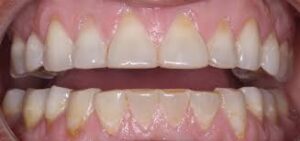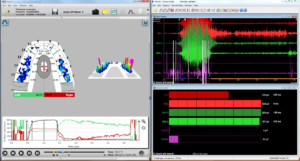
Which came first: the chicken or the egg?
This question reminds me of bruxism (bruk-siz-um), a condition that causes grinding and clenching of teeth. Although most people who brux do so during sleep (sleep bruxism), a growing number of American adults are experiencing the problem during waking hours.
People who develop bruxism may do so as a subconscious reaction to stress or anxiety. It occurs most often during sleep, with many people unaware they are grinding or clenching. Sleep bruxism is likely to be accompanied by other sleep disorders, such as snoring and sleep apnea (pauses in breathing).
Because of the pandemic, politics and uncertainty of job security, a growing number of adults are waking up with headaches, jaw joint pain and ear pain. For adults who did not experience these problems 2 – 3 years ago, they are likely reacting to tension. This is because people often hold tension in their jaw. This places stress or strain on the jaw joints (Temporo-Mandibular Joints, commonly referred to as “TMJ”).
 Jaw joint tension can extend as far out as the ears, neck and shoulders. Some people can even experience tingling in their arms or fingers. These far-reaching symptoms of bruxing are not uncommon reactions to TMJ disorder. While it does not always cause symptoms, grinding or clenching teeth can wear down, fracture or break teeth over time.
Jaw joint tension can extend as far out as the ears, neck and shoulders. Some people can even experience tingling in their arms or fingers. These far-reaching symptoms of bruxing are not uncommon reactions to TMJ disorder. While it does not always cause symptoms, grinding or clenching teeth can wear down, fracture or break teeth over time.
Signs and symptoms of bruxism may include:
• Dull headache starting in the temples
• Teeth that are chipped, fractured, or loose
• Worn teeth (with tops of teeth flattened)
• Increased tooth pain or sensitivity
• Tired or tight jaw muscles
• Jaw, neck or face pain or soreness
• Pain that feels like an earache or ear ringing
• Dizziness or vertigo
• Disruption during sleep
Obviously, the TMJ can be source of many problems, some which are not always associated with it. The challenge, as a Neuromuscular Dentist, is accurately determining whether these problems are:
a reaction to high stress levels OR
a bite misalignment OR
a combination of the two.
A Neuromuscular Dentist has advanced training beyond dental school to assess the interactions of bite alignment, jaw joint function, head and neck muscles, and airway passages. Although many people are having obvious TMJ-related symptoms emerge for the first time, stress factors may have been the catalyst that brought underlying reactions of a bite disorder to the surface.
For example, if your bite was slightly “off” prior to the past year or so, you may have not have noticed you were clenching occasionally during sleep. However, with the reaction of your jaw joints to higher levels of stress, the disparity in your bite may accentuate the problem, simply bringing it to the surface now.
In addition to stress and bite misalignment, other triggers of bruxism are:
Age (while fairly common in young children, it is often resolved by adulthood)
Personality (more likely in types who are aggressive, competitive or hyperactive)
Medications (can be a side effect of antidepressants)
Smoking, caffeine or alcohol consumption, or using recreational drugs
Family history of bruxism
Certain health disorders, such as Parkinson’s disease, dementia, GERD, epilepsy, sleep apnea, and ADHD (attention-deficit/hyperactivity disorder)
This brings us back to the chicken or the egg…
Does bite misalignment play a role in your clenching and grinding?
Are your headaches and sore jaw joints a reaction to stress alone?
In a quest for a resolution to these problems, some people spend years (and many dollars) seeing eye and ear specialists, chiropractors and neurologists. Eventually, they may experience some relief, or relief that is temporary. Only a neuromuscular dentist has the specific training to diagnose (or rule out) TMJ disorders and, if the TMJ is the culprit, determine its source.
Unlike many dental offices, our Shelby Township dental office has incorporated highly-advanced technology specifically for TMJ-related disorders (including sleep apnea). Utilizing these features, we are able to quickly assess the factors that play a role. This technology evaluates the resting position of the jaw joints, bite and jaw position, movements during chewing and speaking, muscle function, and supporting bone structures. And, the diagnosis process is painless with results available on the same day (in most cases).
If bruxing is present due to stress factors, mild bruxism may not require treatment. In these situations, a ‘bite guard’ is often advised to protect teeth from damage. These are custom-designed to fit comfortably in the mouth and do not interfere with sleep. More extensive cases may require repair of damaged teeth, adjustment of the bite (which may be done with reshaping of certain teeth or orthodontics) or oral appliances.
Like the chicken and the egg, the originating cause of bruxism can be debatable – UNTIL get to a doctor who is trained to find the answer and know how to treat it. Begin with a free consultation. During this time, we can discuss the process and I’ll gladly answer your questions.
Let us save your teeth and restore your comfort, without guesswork. Call 586-739-2155 or tap here to schedule your free consultation.